|
|
|
Sort Order |
|
|
|
Items / Page
|
|
|
|
|
|
|
| Srl | Item |
| 1 |
ID:
130868
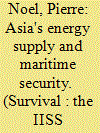

|
|
|
|
|
| Publication |
2014.
|
| Summary/Abstract |
Asia's reliance on international, seaborne energy trade is conducive to strategic cooperation. Whether this will outweigh strategic competition is far from certain. The Asia-Pacific accounts for a large and growing share of the world's energy-demand growth. With imports rising faster than consumption, the region is rapidly becoming the new centre of gravity for global energy markets. Such dynamics have made energy security a key policy concern for Asian states. The naval capacities of these countries are also growing swiftly, prompting some analysts to ask whether an arms race has begun. Although no one would suggest that this build-up of naval power is primarily driven by the need to secure energy supplies, the Chinese and Indian governments have identified energy and resource security as one rationale for developing naval power, particularly blue-water capabilities.
|
|
|
|
|
|
|
|
|
|
|
|
|
|
|
|
| 2 |
ID:
176245
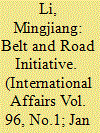

|
|
|
|
|
| Summary/Abstract |
The Belt and Road Initiative (BRI) has been regarded by international society as a major policy tool in China's geo-economic strategy. Under this policy platform, Beijing has pledged to invest billions of dollars in the infrastructure and industrial sectors across Eurasia and in the Indo-Pacific nations. It is widely believed that such huge amount of investment will inevitably generate significant geostrategic repercussions in these regions. In response to the BRI, the United States and other powers have come up with a ‘free and open Indo-Pacific’ strategy. This article attempts to address the following question: what impact is the BRI likely to have on the security ties between China and the other major players in the Indo-Pacific? The author finds that the BRI may significantly transform China's international security policy and the expansion of Beijing's security influence may further intensify the security competition between China and other major powers in the Indo-Pacific region. The article also proposes a new analytical angle for the study of geo-economics that unpacks the role of economic activities and processes in generating geopolitical intentions and catalysing geopolitical competition.
|
|
|
|
|
|
|
|
|
|
|
|
|
|
|
|
| 3 |
ID:
131416


|
|
|
|
|
| Publication |
2014.
|
| Summary/Abstract |
The two-centuries-old hegemony of the West is coming to an end. The 'revolutions of modernity' that fuelled the rise of the West are now accessible to all states. As a consequence, the power gap that developed during the nineteenth century and which served as the foundation for a core-periphery international order is closing. The result is a shift from a world of 'centred globalism' to one of 'decentred globalism'. At the same time, as power is becoming more diffuse, the degree of ideological difference among the leading powers is shrinking. Indeed, because all Great Powers in the contemporary world are in some form capitalist, the ideological bandwidth of the emerging international order is narrower than it has been for a century. The question is whether this relative ideological homogeneity will generate geo-economic or geopolitical competition among the four main modes of capitalist governance: liberal democratic, social democratic, competitive authoritarian and state bureaucratic. This article assesses the strengths and weaknesses of these four modes of capitalist governance, and probes the main contours of inter-capitalist competition. Will the political differences between democratic and authoritarian capitalists override their shared interests or be mediated by them? Will there be conflicting capitalisms as there were in the early part of the twentieth century? Or will the contemporary world see the development of some kind of concert of capitalist powers? A world of politically differentiated capitalisms is likely to be with us for some time. As such, a central task facing policy-makers is to ensure that geo-economic competition takes place without generating geopolitical conflict.
|
|
|
|
|
|
|
|
|
|
|
|
|
|
|
|
| 4 |
ID:
197290


|
|
|
|
|
| Summary/Abstract |
In 1947, the establishment of Pakistan was accompanied by a profound security dilemma, particularly concerning its relationship with India, a dynamic that continues to significantly influence its foreign policy trajectory. Historically, Pakistan’s focus on state security has driven its alliances, notably with the United States and, more recently, with China. The dual objectives of achieving security through economic development have become increasingly pronounced in the context of Pakistan’s deepening partnership with China, especially as evidenced by the substantial investments made in the China-Pakistan Economic Corridor (CPEC). Since the inception of CPEC in 2015, Pakistan has actively sought to leverage this initiative to provide landlocked Central Asian Republics with critical access to maritime routes via the Gwadar Port. Confronted with numerous challenges, including a severe economic crisis, Islamabad is progressively recognizing the necessity of prioritizing geo-economics over traditional geopolitical considerations. This pivot aims to capitalize on its strategic location to foster economic growth through enhanced trade and connectivity, which is largely dependent on the partnership with China. This study undertakes an in-depth analysis of archival data from both primary and secondary sources to explore this phenomenon. This study argues that Pakistan’s foreign policy increasingly reflects an embrace of geo-economics, driven by a combination of domestic factors and China’s pronounced emphasis on the geo-economic potential of CPEC. While Pakistan asserts a commitment to prioritizing geo-economics, its relationship with China remains influenced by enduring geostrategic considerations, particularly in relation to India.
|
|
|
|
|
|
|
|
|
|
|
|
|
|
|
|
| 5 |
ID:
184410
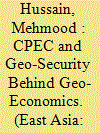

|
|
|
|
|
| Summary/Abstract |
The paper employed a geo-economics approach to investigate the twofold Chinese geopolitical intentions behind the execution of the China-Pakistan Economic Corridor. China financed the CPEC project to overcome energy security and terrorism in Xinjiang. The paper examines the correlation between economic development and security objectives by answering the following key questions. (a) Whether CPEC has the potential to alleviate China’s energy and security dilemma? (b) To what extent CPEC can act as a lever to achieve security interests? The paper argues that geopolitical and geo-security concerns motivate Chinese leadership to use the geo-economics approach. The $65 billion investment in the construction of CPEC has mammoth potential to revitalize the Chinese dream to achieve security through economic and infrastructure development. For Beijing, infrastructure and economic development along the corridor belt would guarantee peace and security in Xinjiang and an overland route of CPEC for energy supplies will circumvent the Malacca dilemma alleviating the threat to the Chinese energy lifeline.
|
|
|
|
|
|
|
|
|
|
|
|
|
|
|
|
| 6 |
ID:
192143


|
|
|
|
|
| Summary/Abstract |
US President Joe Biden has worked to repair the damage done to the transatlantic relationship by his predecessor, quickly realigning the United States with Europe on issues of energy and climate change. However, the US Inflation Reduction Act (IRA) of 2022 introduced a raft of protectionist subsidies for US clean-energy industries and reignited tensions between the US and the European Union. The EU has warned that the IRA could damage the bloc’s industry and American critics suggest the act may trigger a new US–EU trade war. The Biden administration’s geopolitical internationalism is at odds with its geo-economic nationalism. The fact remains, however, that Europe is unlikely to be severely affected by the IRA. Moreover, European political leaders have threatened more aggressive responses to the IRA than they can deliver. A trade war is unlikely. It is more likely that booming green industries in the EU and US will open new avenues to cooperation between them.
|
|
|
|
|
|
|
|
|
|
|
|
|
|
|
|
| 7 |
ID:
128842
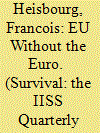

|
|
|
|
|
| Publication |
2014.
|
| Summary/Abstract |
The single currency was supposed to have led to greater political union, but the policies taken to ensure its survival are having the opposite effect. An orderly retreat from the euro might be the EU's least-bad option. As the euro area enters its seventh year of economic stagnation, the future of the European integration process remains in suspense. In the medium-to-long term, highly divergent scenarios remain possible, with variable degrees of likelihood, from full-blown federalisation at one extreme to the catastrophic collapse of the euro and of the European Union at the other. Somewhere in between comes the actual set of policies currently followed, sometimes described as 'muddling through', more aptly called 'muddling down' in terms of its effects on growth and mass unemployment. Since the middle of 2012, the mix of recessive policies of 'internal devaluation', limited pooling of eurozone liabilities and decisive intervention by the European Central Bank (ECB) have deferred for an undetermined period of time the risk of a disorderly break-up of the euro. The strategic consequences of this range of potential and actual policy paths have been discussed in previous issues of Survival.
|
|
|
|
|
|
|
|
|
|
|
|
|
|
|
|
| 8 |
ID:
141114
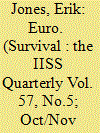

|
|
|
|
|
| Summary/Abstract |
Europe’s monetary union changed fundamentally on 10 July 2015, when German Finance Minister Wolfgang Schäuble tabled a proposal for Greece to leave the euro, temporarily, while it sorted out its public finances and other related economic reforms.1 Until that moment, Europe’s monetary union had been a system of irreversibly fixed exchange rates. Once this proposal was made – by the powerful finance minister of the only country capable of carrying out the threat – membership of Europe’s fixed-exchange-rate regime became conditional. The euro is still a shared multinational currency with a common European Central Bank (ECB), and the European Union (EU) retains its institutions for coordinating macroeconomic policy across the eurozone. Nevertheless, the shift from ‘irreversible’ to ‘conditional’ was important.
|
|
|
|
|
|
|
|
|
|
|
|
|
|
|
|
| 9 |
ID:
071313
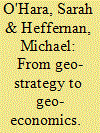

|
|
|
|
|
| Publication |
2006.
|
| Summary/Abstract |
In this paper we examine the changing perception of Central Asia and the Caucasus to Imperial Britain from the mid nineteenth to the mid twentieth centuries and consider the importance of Mackinder's 1904 paper 'The Geographical Pivot of History' to this process. In it we argue that Central Asia and the Caucasus are seen first as an important buffer zone essential to keeping the Russia aggressors at bay and ensuring Britain's continued dominance of India. By the end of the nineteenth century, however, the region had emerged as a major source of raw materials, particularly oil, and as such was no longer seen as merely a buffer zone, but a considerable prize in itself. Mackinder's paper, which emerged at a critical point in this transition, served as an important synthesis of these long-standing and widely shared British concerns about the region and provided a clear and concise assessment of the region's geo-strategic and geo-economic importance and as such its global significance.
|
|
|
|
|
|
|
|
|
|
|
|
|
|
|
|
| 10 |
ID:
130916
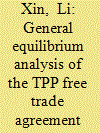

|
|
|
|
|
| Publication |
2014.
|
| Summary/Abstract |
The approaching tenth year of the Doha Round with no achievements to celebrate indicates a failure of the World Trade Organization. Formal negotiations of the Round expired in 2005 without reaching a consensus, and informal negotiations were stalled in 2008. Thus, the Trans-Pacific Partnership (TPP), a recent initiative to deepen trade relations among countries bordering the Pacific, was greeted with applause and relief as a step in the right direction. This article discusses the region-wide Free Trade Agreement series of linked agreements that cover various members and issues. The recursive dynamic computable general equilibrium (CGE) model simulates two scenarios against the baseline, namely, a TPP agreement with China and without China. The preliminary results show that the TPP agreement without China cannot change the significant roles of markets and geography as the principal factors behind the economic integration of Southeast Asia with China. Trade and investment agreements facilitate market forces, they do not oppose them. The integration of the Asia-Pacific countries may benefit the US and other key economies.
|
|
|
|
|
|
|
|
|
|
|
|
|
|
|
|
| 11 |
ID:
092757
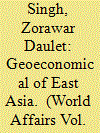

|
|
|
| 12 |
ID:
193595
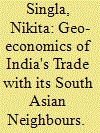

|
|
|
|
|
| Summary/Abstract |
India’s global ambitions are intricately linked to its growth as a leading nation as well as its regional influence. Brimming with opportunity yet equally troubled by challenges deep-rooted in its vast expanses, history and extra-regional geopolitics, cooperation in South Asia has proved to be a predicament as unique as the region itself. It is argued that South Asia’s performance in terms of socioeconomic indicators depends to a large extent on India’s geo-economics, and hence, this essay focuses on the use of trade policy in the geo-economics of India with its neighbours. On one hand, trade and investment figures indicate India’s position as the gravitational core in South Asia has weakened. On the other hand, it is doing more than ever under the aegis of the “Neighbourhood First” and the “Act East” policy to strengthen connectivity infrastructure at the sub-regional level, given the sombre achievements of the SAARC region as a whole in strengthening regional economic ties. The essay makes pointed recommendations for effective regionalism amongst the South Asian nations.
|
|
|
|
|
|
|
|
|
|
|
|
|
|
|
|
| 13 |
ID:
161054
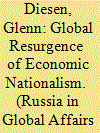

|
|
|
|
|
| Summary/Abstract |
Economic nationalism advocates state intervention in the market to create favorable symmetry in economic interdependence with other powers. All major economies have ascended to greatness with state interventions, and economic liberalism becomes a mere covert economic nationalism by hegemons. Once in control over the levers of the global economy it is in the interest of the hegemon to propagate economic liberalism to integrate other powers into asymmetrical interdependent partnerships. The Trump administration’s embrace of overt economic nationalism indicates the unravelling of the U.S. privileged geo-economic position. Relative decline is evident by a crumbling U.S. manufacturing base and narrowing superiority in innovations, the creation of alternative trade corridors outside U.S. control, and nascent rivals to the Bretton Wood institutions and the U.S. dollar. As geo-economic power shifts from the West to the East and invokes a global resurgence of economic nationalism, opportunities arise for Russia to develop more symmetry in the interdependent global economy.
|
|
|
|
|
|
|
|
|
|
|
|
|
|
|
|
| 14 |
ID:
157201
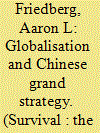

|
|
|
|
|
| Summary/Abstract |
Deng Xiaoping’s initiation of the ‘reform and opening up’ programme at the end of 1978 appears in retrospect to be the decisive turning point in the history of modern China. Increasing reliance on market forces, as opposed to state planning, and deeper integration into the global economy, in place of the old policy of self-imposed isolation and virtual autarky, launched China onto a steep growth trajectory. By any measure, economic or strategic, China’s decision to join the world has been an enormous success, raising the standard of living of hundreds of millions of people, enhancing the nation’s influence and prestige, and paving the way for its eventual re-emergence as a regional and global power on a par with the United States.
|
|
|
|
|
|
|
|
|
|
|
|
|
|
|
|
| 15 |
ID:
130867
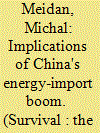

|
|
|
|
|
| Publication |
2014.
|
| Summary/Abstract |
Ensuring access to foreign oil has lost its dominance in Beijing's energy-policy debates. Ensuring access to ever larger quantities of foreign oil has been a focus of debate in China since the late 1990s, when the country's growing oil-import dependence became an inescapable reality. Research institutes and advisers to the Chinese leadership had been preoccupied with identifying the risks associated with China's foreign-oil supplies and devising policies to mitigate them. Yet, as the debate unfolded, it became clear that securing oil supplies was only part of the problem. The overall balance of energy supply and demand, the impact of state-controlled pricing and administrative intervention on the domestic market, and the weakness of institutions governing the energy industry came to be seen as problems that were equally, if not more, pressing. Between 2000 and 2004, a series of events highlighted various aspects of China's energy insecurity and, combined with a change of leadership in Beijing, ultimately led to a shift in energy-policy choices.
|
|
|
|
|
|
|
|
|
|
|
|
|
|
|
|
| 16 |
ID:
147474
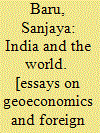

|
|
|
|
|
| Publication |
New Delhi, Academic Foundation, 2016.
|
| Description |
240p.Hbk
|
| Standard Number |
09789332703797
|
|
|
|
|
|
|
|
|
|
|
|
Copies: C:1/I:0,R:0,Q:0
Circulation
| Accession# | | | | | | | | | | | |
| 058789 | 337.54/BAR 058789 | Main | On Shelf | General | | | | | | | |
|
|
|
|
| 17 |
ID:
135806
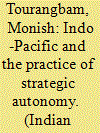

|
|
|
|
|
| Summary/Abstract |
What makes the Indo-Pacific construct appealing to Indian policymakers and the strategic community is that it gives ample scope for the practice of India’s strategic autonomy. It gives space for it to drive the emerging debates as a more direct stakeholder rather than being seen as a co-opted partner in America’s rebalancing strategy in the Asia-pacific region. while the term ‘strategic autonomy needs to be defined based on India’s capabilities and aspirations, it will augur well for India’s own interests to take into confidence other countries in the region (besides the major powers) regarding the viability of this new geopolitical and geo-economic construct. India’s rising capabilities and a sober analysis of its strategic autonomy denotes India’s ability to take foreign policy steps commensurate with its national interests. This includes striking partnerships and coalitions as and when it suits India’s priorities of balancing uninterrupted internal development amidst a stable and secure external environment in the Indo-Pacific region.
|
|
|
|
|
|
|
|
|
|
|
|
|
|
|
|
| 18 |
ID:
147979
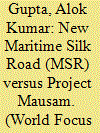

|
|
|
|
|
| Summary/Abstract |
Alfred Thayer Mahan in his book The Influence of Sea Power upon History 1660-1783 most famously presented his concept of ‘sea power’ which was based on the idea that countries with greater naval power will have greater worldwide impact. His concept had an enormous influence in shaping the strategic thought of navies across the world, especially those of United States, Germany, Japan and Great Britain. His concept ultimately led to European naval arms race in the 1890s. It was indeed a revolutionary analysis of the importance of naval power as a factor in the rise of the British Empire. Mahan’s argument that British control over the seas, combined with a corresponding decline in the naval strength of its major European rivals paved the way for Great Britain’s emergence as the world’s dominant military, political and economic power.
|
|
|
|
|
|
|
|
|
|
|
|
|
|
|
|
| 19 |
ID:
134215


|
|
|
|
|
| Publication |
2014.
|
| Summary/Abstract |
This article introduces a cross-cultural research project involving researchers from Bangkok, Thailand, and Vienna, Austria, and explores the effects of social network services (SNS) on practices of friendship initiation and relationship management among young adults. The focus of inquiry was on differences with regard to the organization of social networks, practices of friendship management, and the mutual interference between media and technology usage and lifestyles. On the basis of explorative interviews and group discussions with young adults living in the two cities studied, we developed a standardized online questionnaire to examine how participation in SNS, such as "Facebook" and "Hi5," has an impact on the meaning of friendship. In addition, we analyzed ego-network structures and their implications for social integration.
|
|
|
|
|
|
|
|
|
|
|
|
|
|
|
|
| 20 |
ID:
173180
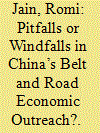

|
|
|
|
|
| Summary/Abstract |
In just over six years, China’s Belt and Road Initiative has swiftly expanded to vast swaths of the globe, with as many as 138 countries signing on. In 2017, President Xi Jinping’s signature project was incorporated into the Chinese constitution, assuming extraordinary significance as the “project of the century.” China has couched the program in multilateral terms, with a promise of shared benefits through road and maritime connectivity projects, reviving the ancient Silk Road and revivifying the spirit of commercial, cultural and academic exchange. Cooperation among member countries is envisaged in policy coordination, facilities connectivity, unimpeded trade, financial integration, and people-to-people bonds. However, an active debate has ensued surrounding China’s motivations and the initiative’s potential outcomes for the host countries. Against this backdrop, I examine the economic implications for host countries and regions, using a geo-economic analytical framework.
|
|
|
|
|
|
|
|
|
|
|
|
|
|
|
|
|
|
|
|
|